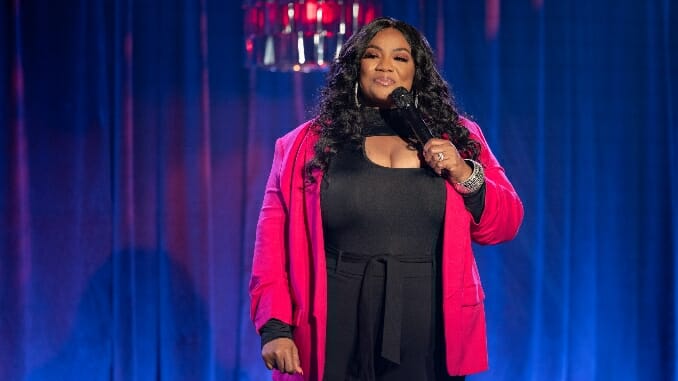Ms. Pat Doesn’t Dwell on Things She Can’t Control—But She Does Make Fun of Them
Image courtesy of Quantrell Colbert/Netflix
On February 8, comedian Ms. Pat’s first full-length stand-up special, Y’all Wanna Hear Something Crazy?, premiered on Netflix. Ms. Pat’s led a rough life, to say the least—she had two children, fathered by a man eight years her senior who had sexually abused her since she was 12, and by age 15 and started selling crack to support them. She started making fun of her experiences onstage at age 30, after her caseworker suggested she try it. As a longtime fan of Ms. Pat, I was pleased to see her genuinely having a good time in this special, maintaining her consistent comedy thesis: “I don’t dwell on shit I don’t have control over.”
But I can’t write about this without acknowledging one particular moment about halfway through her performance. While describing assisting her disabled uncle in his endeavor to bed a sex worker procured by his dad, Ms. Pat’s grandfather, Ms. Pat refers to her uncle as “r*tarded” and proceeds to explain that this was the correct terminology at the time, so she chooses to use it now.
Considering the use of that language wasn’t removed from government documents until a 2010 act was passed and still appeared in the DSM until 2013, I don’t blame Ms. Pat’s assumption that the harm caused by the use of it is a new phenomenon. It’s also used in a way that, to me, comes across as deflective but loving. Let me explain.
In 2015, I suffered a severe traumatic brain injury, was in a 10-day coma and became permanently disabled. To say I was impaired and that my mental faculties were drastically impeded was an understatement. During this time, my brother, who had been diagnosed with schizophrenia a few months prior, referred to me, lovingly, as his “r*tarded” little sister. I bring this up to explain how the way we talk about someone else’s trauma is defined by our own framing of it.
In this instance with my brother, and in Ms. Pat using the slur toward her uncle, I believe it was done to preserve their senses of safety and self-preservation. For my brother, it was his way of coming to terms with his diagnosis by thinking to himself, “I may have this medical condition, but if my sister can be this damaged and I still love her, then maybe it’s okay.”
-

-

-

-

-

-

-

-

-

-

-

-

-

-

-

-

-

-

-

-

-

-

-

-

-

-

-

-

-

-

-

-

-

-

-

-

-

-

-

-








































